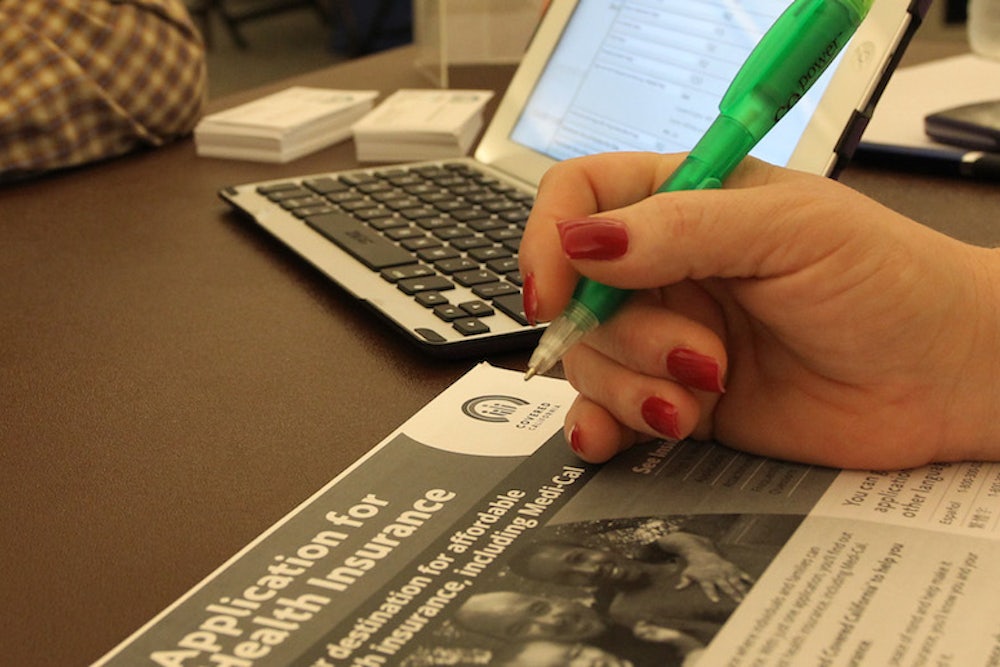CBS News released a devastating poll on Wednesday: “President Obama's job approval rating has plunged to the lowest of his presidency… and Americans' approval of the Affordable Care Act has dropped to its lowest since CBS News started polling on the law.” Other polls have been equally dismal. (I know of at least one more coming out on Thursday.) This is exactly what you would expect given all of the problems with healthcare.gov—and the realization by several million Americans that, no, they won’t get to keep their health insurance plans. It's terrible news, plain and simple.
But it happened to come on a day when there was also some good news on the policy front. It was a report from the president’s Council on Economic Advisers, about health care spending and how much government and private insurers spend per person. That spending is going up, because it always goes up. But ever since the Affordable Care Act became law, it’s been going up more slowly than at any point in history.
You can see it by looking at how much we spend on health care for people through each of the country’s three largest insurance arrangements—private, Medicare, and Medicaid. [See graph below.] On a per person basis, private insurance spending rose by just a little more than 1 percent between 2010 and 2013, while Medicare spending remained flat and Medicaid spending actually declined a bit. The growth rates for all three were substantially lower than the rates for previous years. Those numbers don’t account for out-of-pocket expenditures, as far as I can tell, but the overall inflation rate for medical goods and services is also at historic lows, according to the report.
Less spending isn't always a good thing—in theory, it can mean lower quality care or worse access. But the signs in this case point in the opposite direction, for several reasons. Among them is something else the CEA report cites: A dramatic decline in the rate of readmissions. (Again, see graph below.) When a hospital has to readmit a patient it discharged within the last 30 days, that's usually a sign of poor quality care, whether it’s during the inpatient stay or during the recovery outside the hospital. One of the Affordable Care Act’s “payment reforms” is a penalty on hospitals that have high rates of readmission. (The theory is that hospitals can improve both inpatient and follow-up care.) Given the scale and timing of the decline, most experts believe Obamacare is the likeliest explanation for the change. As Sarah Kliff of the Washington Post notes, “Cost savings aside, that's great news for patients, suggesting that the quality of care hospitals are delivering is improving at the same time that spending on that care is slowing down.”
But readmissions aside, just how much of the spending slowdown is really because of Obamacare? Nobody knows for sure and, honestly, it will be some time before anybody can make anything approaching a definitive judgment. As experts will quickly tell you, at least two other factors are also restraining health care costs. One is the recession and its lingering effects, which has left people poorer. When people have less money to spend, they are less quick to seek medical care. It’s basic economics. The other is a shift in private insurance, towards policies that include higher out-of-pocket spending. This, too, is making people more reluctant to get medical care. (Conservatives will take this as validation higher out-of-pocket spending can slow spending—a fair point!) Still, the majority of experts now believe Obamacare is at least partly responsible for the slowdown. They think it is encouraging permanent, structural changes in medical care—the kind that will generate more and more savings over time.
The slowdown's effects are largely invisible. They take the form of premium and tax increases that people will never have to pay. But the effects seem very real—and, if so, they constitute a bona fide policy success, the kind that even many experts once doubted was possible. It may not show up in the polls. But it will show up in people's wallets.
